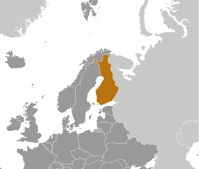
#17,573
Although the summer months are supposed to be the nadir of the avian flu season, this summer we continue to see major outbreaks around the world (see EFSA Statement on Avian Flu).
In the past few weeks we've seen unprecedented outbreaks in Polish domestic cats, reports of thousands of sea mammals killed in South America, and at least a dozen fur farms (with > 120,000 animals) in Finland affected by the virus.
Last week Finland announced the decision to establish a bird flu transmission zone in a handful of affected provinces.
Today they are expanding that zone to include the provinces of Uudenmaa, Kanta-Häme, Pirkanmaa and Päijät-Häme.
(Continue . . . )
(Translated)establish a bird flu transmission zone
The Finnish Food Agency is expanding the bird flu transmission zone
July 25, 2023
In Finland, in June-July 2023, highly pathogenic bird flu of the H5N1 type has been detected in several localities. The disease has been found especially in seagulls. In addition, the disease caused by the virus has been found in farmed fur animals in Southern and Central Ostrobothnia. Currently, the infection has been confirmed on twelve fur farms. Investigations are still ongoing.
The Food Agency expands the decision made on 20 July 2023 about the infection zone made under the Animal Diseases Act, which aims to prevent the further spread of the disease. In addition to the provinces of Varsinais-Suomi, Satakunta, Etelä Ostrobothnia, Ostrobothnia and Central Ostrobothnia, the infection zone now also covers the provinces of Uudenmaa, Kanta-Häme, Pirkanmaa and Päijät-Häme. The decision is effective immediately.
It is forbidden to keep poultry and captive birds outside in the infected zone. The ban also applies to venues engaged in organic production. Exceptions can be found in the decision.
Measures to be taken in the infection zone to prevent the spread of infectionThe infection zone is abolished when the Food Agency assesses that there is no longer a need for it to prevent the spread of bird flu. The Food Agency also informs separately about the termination of the zone.
- Visits by persons to the animal shelter for poultry and captive birds are prohibited for reasons other than essential.
- Persons visiting an animal shelter for poultry or captive birds must wear only the protective clothing used in that animal shelter, and change footwear when entering and exiting the animal shelter. In addition, hands must be washed and disinfected when entering the animal shelter. If it is not possible to wash your hands, you must still disinfect your hands.
- Bird feeds and bedding must be stored so that wild birds cannot come into contact with them.
The Food Agency recommends that poultry be carefully protected in other parts of the country as well. If symptoms suggestive of bird flu, abnormal mortality or changes in production are observed in poultry or other birds, the municipal or county veterinarian must be notified immediately. A decrease in water and feed consumption or egg production can be signs of bird flu infection.
Mass deaths of wild birds and individual dead birds of prey must also be reported to the municipal or county veterinarian. The municipal veterinarian takes care of sending the necessary samples to the Helsinki office of the Food Agency.
Avian flu viruses are poorly contagious to humans, and infection usually requires close contact with an infected wild bird, poultry or their secretions.
Read more:
Decision on expanding the transmission zone under the Animal Diseases Act 25 July 2023
(Continue . . . )
